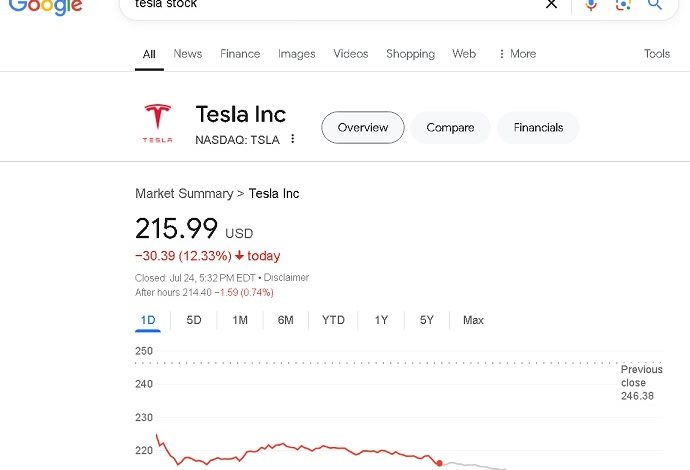Tesla Stock Takes a Hit: Key Factors Behind the Drop
Several Reasons Why Tesla's Stock Just Crashed

Hey there stock market investors, Tesla enthusiasts! You might have noticed a bit of turbulence with Tesla’s stock recently. If you’re wondering what caused this sudden drop, you’re in the right place. Stocks can be a rollercoaster, and Tesla’s no stranger to ups and downs. Let’s dive into the main reasons behind the latest dip and see what’s been shaking things up. From earnings reports to market sentiment, we’ll cover it all in a friendly, easy-to-understand way. So, buckle up and let’s get started!
Earnings Report Miss
Alright, let’s talk earnings. Imagine expecting a huge bonus, but you get a smaller check instead—pretty disappointing, right? That’s what happened with Tesla. Investors had high hopes for Tesla’s latest earnings report, expecting big numbers in revenue and profit. But when the actual figures came in lower than anticipated, it was like a cold splash of water. This miss in the earnings report spooked investors, leading many to sell off their shares, which in turn caused the stock price to drop. It’s a classic case of expectations versus reality in the stock market.
Production Challenges
Now, let’s shift gears and talk about production. Picture this: Tesla’s factories are humming along, but suddenly, they hit a snag. Maybe it’s a delay in getting crucial parts, or perhaps there’s an unexpected issue on the assembly line. These hiccups can really throw a wrench in Tesla’s plans. Production challenges mean fewer cars rolling out of the factory, which directly impacts sales and revenue.
When investors hear about these production issues, they start to worry. They know that any disruption can affect Tesla’s ability to meet its targets and fulfill customer demand. This worry often leads to a sell-off, driving the stock price down. It’s like hearing your favorite restaurant is having supply issues—you’d probably think twice before making a reservation. The same goes for investors when it comes to Tesla’s production woes.
Increased Competition
Let’s talk about competition. Tesla might be the king of electric vehicles (EVs), but other carmakers are catching up fast. Companies like Ford, General Motors, and new players like Rivian are all rolling out impressive EV models. This surge in competition means that Tesla has to work even harder to maintain its market share and brand loyalty.
When investors see strong contenders entering the EV market, they start to worry about Tesla’s future growth. If buyers have more choices, Tesla’s sales could take a hit. This fear of losing market share often leads investors to sell off their Tesla stocks, driving the price down. It’s like seeing a new, trendy café opening up next to your favorite coffee shop—it makes you wonder if the old favorite will still hold its charm.
Regulatory Concerns
Next up, let’s dive into the world of regulations. Governments around the globe are constantly tweaking their rules, especially when it comes to emissions standards and EV incentives. These changes can have a big impact on Tesla. For example, if a government decides to reduce subsidies for electric vehicles, it could make Tesla cars more expensive for buyers, potentially lowering sales.
When such regulatory changes are announced, investors can get jittery. They know that stricter emissions rules or reduced incentives can hurt Tesla’s competitive edge. This uncertainty often leads to a sell-off, driving the stock price down. It’s like finding out your favorite product might no longer be available at a discount—you’d probably hesitate before buying it again. The same goes for investors worried about how regulatory shifts might impact Tesla’s future.
Market Sentiment
Let’s chat about market sentiment. The stock market is like a big mood ring, reflecting the emotions and perceptions of investors. When the overall market is jittery, perhaps due to economic uncertainty or global events, even strong stocks like Tesla can feel the heat. Investors might start selling off shares, not because of any direct issue with Tesla, but because they’re nervous about the market in general.
This broad market anxiety can lead to a domino effect. As more people sell, Tesla’s stock price falls, causing even more selling. It’s a cycle driven by fear and uncertainty. Imagine it’s like a stormy weather forecast—it might not rain on your house, but you’re still likely to grab an umbrella just in case. Investors react similarly, pulling back when clouds appear on the market horizon.
Elon Musk’s Influence
Let’s talk about the Elon effect. Tesla’s charismatic CEO, Elon Musk, has a knack for making headlines, and his actions often have a direct impact on the company’s stock. Whether it’s a tweet, a bold statement, or a controversial decision, Musk’s moves can cause significant swings in Tesla’s stock price.
For instance, a tweet about a new product or a comment on company strategy can excite investors, driving the stock up. Conversely, controversial remarks or unpredictable behavior can make investors nervous, leading to a sell-off. It’s a bit like having a superstar player on your team—when they perform well, the team soars, but any misstep can cause a dip in confidence.
For investors considering Tesla, it’s crucial to adopt a balanced approach. Short-term volatility can be unsettling, but evaluating Tesla’s long-term vision and its capacity to overcome these challenges is equally important. Investors should stay informed about both company-specific developments and broader market conditions. Diversifying investments and maintaining a long-term perspective can help navigate the ups and downs of high-growth stocks like Tesla.